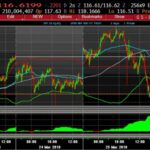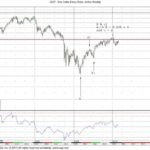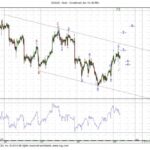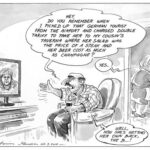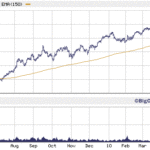Febbraio 19, 2009 EcoAnemia
US Folies
111th CONGRESS
1st Session
H. R. 1068
To amend the Internal Revenue Code of 1986 to impose a tax on certain securities transactions to the extent required to recoup the net cost of the Troubled Asset Relief Program.
IN THE HOUSE OF REPRESENTATIVES
February 13, 2009
Mr. DEFAZIO (for himself, Mr. WELCH, Ms. SUTTON, Mr. CAPUANO, Mr. WU, Mr. STARK, Ms. DELAURO, and Ms. EDWARDS of Maryland) introduced the following bill; which was referred to the Committee on Ways and Means

A BILL
To amend the Internal Revenue Code of 1986 to impose a tax on certain securities transactions to the extent required to recoup the net cost of the Troubled Asset Relief Program.
Be it enacted by the Senate and House of Representatives of the United States of America in Congress assembled,
SECTION 1. SHORT TITLE.
This Act may be cited as the `Let Wall Street Pay for Wall Street’s Bailout Act of 2009′.
SEC. 2. FINDINGS.
Congress finds the following:
(1) The Bush Administration allocated the first $350 billion of TARP funds in a manner that has outraged the Nation by failing to provide the most basic oversight of the funds.
(2) Congress has declined to block the remaining $350 billion of TARP funds despite the lack of oversight and the record fiscal year 2009 budget deficit estimated at $1.2 trillion.
(3) The Board of Governors of the Federal Reserve System has committed more than a trillion dollars to stabilize the economy by bailing out various banks deemed `too big to fail’.
(4) The $700 billion TARP fund and the new Federal Reserve lending facilities were created to protect Wall Street investors; therefore, the same Wall Street investors should pay for this infusion of taxpayer money.

(5) The easiest method to raise the money from Wall Street is a securities transfer tax, a tax that has a negligible impact on the average investor.
(6) This transfer tax would be on the sale and purchase of financial instruments such as stock, options, and futures. A quarter percent (0.25 percent) tax on financial transactions could raise approximately $150 billion a year.
(7) The United States had a transfer tax from 1914 to 1966. The Revenue Act of 1914 (Act of Oct. 22, 1914 (ch. 331, 38 Stat. 745)) levied a 0.2 percent tax on all sales or transfers of stock. In 1932, Congress more than doubled the tax to help overcome the budgetary challenges during the Great Depression.
(8) All revenue generated by this transfer tax should be deposited in the general fund of the Treasury of the United States, scaled to meet the net cost of these bailouts, and phase out when the cost of the bailouts are repaid.
SEC. 3. RECOUPMENT OF DEFICIT ARISING FROM FEDERAL BAILOUT.
(a) In General- Chapter 36 of the Internal Revenue Code of 1986 is amended by inserting after subchapter B the following new subchapter:
`Subchapter C–Tax on Securities Transactions
`Sec. 4475. Tax on securities transactions.
`SEC. 4475. TAX ON SECURITIES TRANSACTIONS.
`(a) Imposition of Tax- There is hereby imposed a tax on each covered securities transaction an amount equal to the applicable percentage of the value of the security involved in such transaction.
`(b) By Whom Paid- The tax imposed by this section shall be paid by the trading facility on which the transaction occurs.
`(c) Applicable Percentage- For purposes of this section–
(1) IN GENERAL- The term `applicable percentage’ means the lesser of–
`(A) the specified percentage, or
`(B) 0.25 percent.
`(2) SPECIFIED PERCENTAGE-
`(A) IN GENERAL- The term `specified percentage’ means, with respect to any taxable year beginning in a calendar year, the percentage that the Secretary estimates would result in the aggregate revenue to the Treasury under this section for such taxable year and all prior taxable years to equal the Secretary’s estimate of the net cost (if any) to the Federal Government of–
`(i) carrying out the Troubled Asset Relief Program established under title 1 of the Emergency Economic Stabilization Act of 2008, and
`(ii) the exercise of authority by the Board of Governors of the Federal Reserve System under the third undesignated paragraph of section 13 of the Federal Reserve Act (12 U.S.C. 343).
`(B) DETERMINATION OF PERCENTAGE- Such percentage shall be determined by the Secretary not later than 30 days after the date of the enactment of this section, and redetermined for taxable years beginning in each calendar year thereafter. Such percentage shall take into account the Secretary’s most recent estimation of such net cost. Any specified percentage determined under this paragraph which is not a multiple of 1/100th of a percentage point shall be rounded to the nearest 1/100th of a percentage point.
`(d) Covered Securities Transaction- The term `covered securities transaction’ means–
`(1) any transaction to which subsection (b), (c), or (d) of section 31 of the Securities Exchange Act of 1934 applies, and
`(2) any transaction subject to the exclusive jurisdiction of the Commodity Futures Trading Commission.
`(e) Administration- The Secretary shall carry out this section in consultation with the Securities and Exchange Commission and the Commodity Futures Trading Commission.’.
(b) Clerical Amendment- The table of subchapters for chapter 36 of such Code is amended by inserting after the item relating to subchapter B the following new item:
`subchapter c. tax on securities transactions’.
(c) Effective Date- The amendments made by this section shall apply to sales occurring more than 30 days after the date of the enactment of this Act.
Fonte : Library of congress
Non sono le chiacchiere che ci vengono propinate dai massmedia.
E non sono certo solo le voci che arrivano di default dei vari paesi.
Ma la minaccia di approvazione di una idiota proposta di legge americana, che già avevo citato tempo fa e che pare stia andando avanti.
Se venisse approvata in questi termini , non ci sarebbe nemmeno bisogno di aspettare : gli S&P finirebbero direttamente a 200 punti, ed i mercati rimarrebbero chiusi per settimane per eccesso di ribasso.
Il Nyse ed il Nasdaq diventerebbero dei mercati fantasma.

Ma non passerà mai.
Sancirebbe la fine definitiva degli USA come potenza finanziaria mondiale.
Nonchè un ritorno al passato di 43 anni – almeno per i cittadini americani, che non hanno più questa forma di tassazione dal 1966.
Il mondo nel frattempo è un pochino cambiato, così come i mercati finanziari…
Analizziamo nel dettaglio la situazione.
Tassa dello 0.25% su ogni transazione finanziaria.
Acquistando 50.000$ in titoli ( o strumenti finanziari di qualsasi genere )si creerebbe una transazione fiscale di 125$.
Vendendo si creerebbe un’altra operazione fiscale di 125$.
Totale : 250$
Indipendentemente dal fatto che l’operazione sia stata chiusa in attivo od in passivo.
Già questo fatto è allo stesso tempo paradossale ed idiota, ma andiamo avanti.
Eseguendo la medesima operazione 250 volte all’anno l’importo totale di transazione fiscale sarebbe di 62.500$.
Significa che se senza una cospicua leva occorre un profitto superiore al 100% annuo per poter pagare la sola tassa di transazione.
Naturalmente se acquisti e vendi in continuazione i titoli.
Solo il cassetto sarebbe l’unica soluzione.
Le uniche chances di sopravvivenza in questo caso sarebbero :
- Un utilizzo smodato della leva.
- Un mercato che sale perpetuamente sempre e comunque.
Bull market forever.
Semplicemente impossibile.

La tassazione dello 0.25% riguarderebbe qualsiasi strumento finanziario che non sia OTC, quindi anche i futures.
Se si tradasse un solo e-mini S&P ogni giorno per un anno, la transazione fiscale totale sarebbe pari a circa 62500$.
Questo disegno di legge non solo causerebbe la fine del day-trading.
Ma soprattutto ridurrerebbe drammaricamente la liquidità presente nei vari mercati (riduzione del numero di operatori commerciali = riduzione del denaro immesso nel mercato).
E di conseguenza,un aumento impressionante della volatilità.
D’altra parte, chi conosce od ha tradato i titoli cosiddetti sottili, sa benessimo che cosa significhi la illiquidità.
Significa uno spread elevato fra ask e bid.
E’ come se per il mercato americano improvvisamente tutto si adeguasse a ciò che succede alle Pink Sheets.
Si farebbe prima a tornare direttamente alle grida.
Tutti i brokers – non solo i piccoli, ma anche colossi come Interactive Brokers ed Ameritrade, che fanno delle basse commissioni il loro punto di forza – non sarebbero più in grado di offrire il loro servizio perché i volumi calerebbero precipitosamente
Sarebbero destinati a chiudere.
Tutte le società che forniscono servizi di supporto come software grafici e di front-end in esecuzione avrebbero un drammatico calo dei loro clienti.
L’unico modo per sopravvivere sarebbe un aumento vertiginoso dei costi.
Questa proposta sarebbe un disastro per i mercati, per tutte le implicazioni conseguenti.
E, lo ripeto ancora come l’altra volta, in un mondo globalizzato come quello di oggi non tutti gli stati e non tutti i mercati andrebbero dietro a questa proposta folle.


